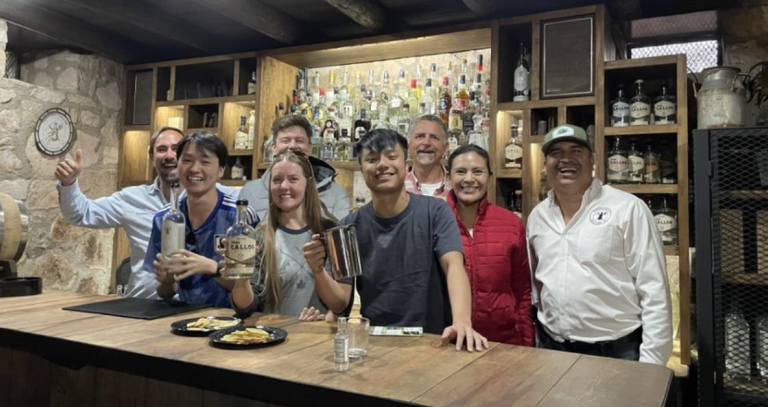Learn about the intersection of tourism and management, and how to influence positive social change.
Explore breathtaking tourism destinations in BC, and build a global network of industry connections and learners around the world.
Complete the last two years of your undergraduate degree on campus. Gain a competitive edge and career experience with a three-month internship in Canada or abroad. Expand your international experience with optional semesters abroad.
Advance your career through hands-on experiences and study key topics, like destination management, tourism attractions, museums and events.
Study on campus
Studying with your class colleagues and instructor on our beautiful RRU campus.
Develop global awareness
Gain skills and knowledge in human resources, strategic planning, event management, communication, leadership and critical thinking.
Learn outside the classroom
A one-week field trip course, international semester options, and a final three-month internship anywhere in the world.
Upcoming offerings
Stay tuned for updates or contact us for more information.
Build industry connections and study with global learners
With the Bachelor of Arts in Global Tourism Management, you'll develop essential skills to advance your career.
Get a local and international perspective by exploring breathtaking tourism destinations right in British Columbia’s own backyard.
Engage in a three-month internship in Canada or abroad, with an opportunity to expand your international experience with optional semesters abroad.
Explore your program delivery options.
You can build from here
Your undergraduate degree can open the door for you to continue with graduate studies at Royal Roads or around the world. Some of our related graduate programs include:
- Master of Arts in Tourism Management
- Master of Global Management
- Master of Arts in Professional Communication
Program outcomes
Once you graduate, you'll have developed a set of skills and a deep understanding of the issues that drive the tourism industry.
You'll graduate with the following:
- Global awareness — You'll learn to analyze and assess the impact of global issues facing tourism managers and how tourism initiatives can impact communities. At the same time, you'll learn to apply sustainable management techniques, build community resilience and develop your multicultural sensitivity.
- Knowledge - While learning approaches to human resource management, you'll develop an understanding of strategic planning for a tourism enterprise. You'll also learn the principles of tourism marketing and event management.
- Critical thinking and problem solving — Using case study scenarios and conceptual models, you'll learn critical analysis, data interpretation and business research skills highly valued in tourism.
- Effective communication — You'll create written materials and oral presentations, participate in class discussions, and improve computer, internet and communications skills.
- Leadership and collaboration — You'll learn how to lead teams through group assignments and activities, and hone your skills needed to be an effective team member in a variety of situations.
You'll be able to successfully apply what you learn to your career, anywhere in the world.
Program delivery
Complete the third and fourth year of your Bachelor of Arts in Global Tourism Management degree on our beautiful campus in 24 months.
On campus
Studying on campus brings you together with your class colleagues and instructors. Expect the program to be rigorous. You’ll do homework, readings and team assignments outside of your full-time class hours. Classroom learning includes three-hour seminars with hands-on practice and teamwork.
Learning outside of the classroom
Practical, experiential learning is an important part of this program. Your studies will allow you to learn outside of the classroom through the following:
- a one-week field trip course
- semester abroad study options
- a final three-month internship
Field trip course
During this course, you'll explore travel destinations on Vancouver Island, including the beaches of Tofino and the slopes of Mount Washington. You'll meet with tourism entrepreneurs to get an understanding of tour operations and current issues faced by the industry. At the same time, you'll have a chance to participate in activities like skiing, snowboarding, whale watching, surfing and stand-up paddle boarding.
Semester abroad
Expand your international and cultural experience. You can choose to study during a semester abroad at any of our partner universities in Korea, India, Austria, Germany, Chile, Vietnam, France or England.
Internship
Complete your program with a three-month professional work placement anywhere in the world. You'll be mentored by a supervisor at your work placement and guided by an academic advisor, as you gain experience in a location and career path of your choice.
Previous internships have taken place in Canada and internationally in positions, such as music festival coordinators, management trainees, front-line workers and tour leaders.
Courses
Faculty
Search suggestions:
-Check your spelling
-Try more general words
-Try using the available filters
Transfer agreements
Refine results
Search suggestions:
-Check your spelling
-Try more general words
-Try using the available filters
Standard admission
- Completion of a diploma (or 60 credits), including a minimum of 24 second-year credits, in areas such as hospitality, tourism, business administration or equivalent, with a minimum GPA of 'B' (3.00/4.33), from a recognized post-secondary institution.
- At least 400 hours of tourism/hospitality related work experience
Flexible admission
- To be considered for flexible admission, applicants would normally require at least five years of mid-level work experience in the tourism/hospitality industry.
English language proficiency
- If English is not your primary language, please review our English language requirements.
Additional recommendation(s)
Solid academic writing skills are required for success in this program; therefore an English composition course focused on academic writing and critical thinking is strongly recommended. APA style citation is used in this program. A basic knowledge of accounting principles is also strongly recommended.
Courses available from Continuing Studies at Royal Roads University that meet these recommendations are:
- Academic Writing and Critical Thinking – Continuing Studies - Academic Support
- Financial Accounting Fundamentals – Continuing Studies - Academic Support
Application requirements
If you've completed some university or college courses, you may be eligible for this degree completion program. Before your file can be assessed for admission, the following information & supporting documents are required for entry to third year.
Application form
In order to apply online, you will be required to create a log-in account using your email address. You will be required to list all credit courses and/or programs you have completed or are currently enrolled in. An application fee will be required. If your application fees are being paid by a third party, review sponsored student information. Once submitted, you may check the status of your application at any time.
Missed your application deadline? While we can’t make any guarantees, we may be able to accommodate late applications if there's still space and enough time to process. If you're interested in an intake that is now closed to applications, apply for the next available intake and email Admissions with your preferred start date. Make sure you’re prepared to submit your program's required documents right away. We can't make an admissions decision without them.
Official transcripts
Applicants are responsible for arranging for the submission of official transcripts from ALL post-secondary (higher education) institutions currently or previously attended, for all credit courses and/or programs. Transcripts are not required for non-credit programs or courses, though some programs may require proof of professional certifications or designations.
Transcripts are considered official only if submitted directly by the Registrar or other recognized authority of the providing institution in the institution's original, sealed envelope. If the envelope has been opened, the transcripts are no longer official and new (official) transcripts will be required to complete your application.
All international transcripts or credentials are subject to an international transcript and/or credential evaluation.
Detailed résumé
- Education: List all post secondary education, degrees, diplomas, and certificates you have achieved.
- Work experience: Please include the name of the organization, length of service (documenting hours per week worked to ensure a minimum of 400 hours business-related experience) and a brief description of duties.
- Voluntary/unpaid work experience: List and describe any voluntary/unpaid post-secondary employment and/or community service experience. Please include the name of the organization, length of service, and a brief description of duties. List positions you have held in this service.
- Information technology training and experience: Briefly describe your level of training and experience in the use of information technology including computers, software and telecommunications networks as tools for business, education, teaching and personal use.
- Professional memberships and affiliations: List memberships and positions you hold/have held in professional associations, service clubs, community/volunteer sector.
- International experience: Please include any international or intercultural experience you have, in the form of travel, work, education, or volunteer experience.
- Other relevant information: Provide any other information which you believe is relevant to your application and will be of assistance to the review committee.
Additional Requirements for Flexible Admission
For applicants who will be reviewed under the flexible admission process the following additional supporting documents will be required:
Personal statement
Your personal statement should consist of (but is not limited to) a two to three page essay, addressing the following four questions:
- What influenced your decision to apply to Royal Roads University?
- Why is this degree appropriate for you?
- What do you hope to contribute to this program and the university?
- In 5-10 years, how do you anticipate this program will add value?
If there is any other information that you feel might be of interest or relevance to your application, please include it in your personal statement.
Letter of reference
Typically, applicants will provide one professional, academic or personal character reference letter.
- Academic reference: This letter should attest to your performance in the context of your current or previous studies. The letter can address such areas as academic achievement, study skills, teamwork, leadership potential, human relations, flexibility, communication, and technical skills.
- Professional reference: This letter should attest to your current or previous performance in your professional life. The letter can address areas such as communication skills, interpersonal and leadership skills, management potential, work ethic, etc.
- Personal character reference: Your personal character reference should consist of a letter from someone who has known you for several years outside of the context of your work. Please ask the writer to indicate the length of time and context in which they have known you, and to consider the following attributes in their letter about you: integrity, responsibility, adaptability, concern and respect for others, sense of self-esteem and confidence, communication skills and work ethic.
If applicable
- Applicants declaring permanent resident or Convention Refugee status in Canada, must submit a copy of their Permanent Resident Card (PR card) along with their application.
- Transcript evaluation fee or credential evaluation report, if submitting international transcripts.
- An official English Language Proficiency score report or other evidence of proficiency if English is not your primary language.
- Other information or documents as may be requested to determine your eligibility.
For information on how and where to send your supporting documents, please refer to the document submission guidelines.


